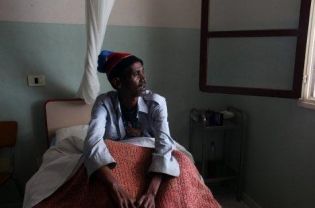
Indonesia has been awarded with an achievement award from the US Agency for International Development (USAID)’s Global Health unit for its successful campaign in tuberculosis management, amid growing success fighting the disease throughout Southeast Asia.
“On March 20, we received the achievement award from USAID for our program in tuberculosis management which has been appreciated internationally,” director general of disease control and environmental health to the Ministry of Health, Tjandra Yoga Aditama, said on Thursday.
The award was received by Dino Patti Djalal, Indonesia’s ambassador to the United States, in Washington DC.
Tjandra said based on data from 1990 to 2010, Indonesia has been able to decrease the incidences, prevalence and deaths related to tuberculosis.
“We managed to decrease the incidence rate from 343 per 100,000 in 1990 to 189 per 100,000 people in 2010, and we also reduced the death because of TB by 71 percent from 92 deaths per 100,000 population to 27 out 100,000, which means we have achieved the target set by the Millennium Development Goals,” he said.
Despite the significant progress in reducing deaths from tuberculosis, Tjandra said the disease remained a very serious health issue because of the massive number of patients and deaths, along with more complicated health implications.
“There are many new challenges such as the high number of co-infection between TB and HIV/AIDS and the growing number of multi-drug resistant tuberculosis (MDR-TB) even though we reduced the number but the sufferers and the deaths because of TB remain really high,” he said.
Tjandra said the government has been trying to set up several new programs, including advancing treatment standards at hospitals and installing more Gen Experts — medical devices that can detect tuberculosis and MDR-TB quickly and accurately.
Meanwhile the World Health Organization said on Thursday that significantly fewer people are dying of tuberculosis in Southeast Asia in the modern day, compared with 1990.
The death rate due to the disease has decreased by more than 40 percent in the past 13 years because of greater public awareness of the disease, an increased number of cases being detected and greater access to adequate treatment, a WHO statement said.
Samlee Plianbangchang, regional director of WHO in the Southeast Asia region, emphasized that eliminating tuberculosis is a social and public health responsibility.
“To successfully eliminate TB, we must pay attention to the underlying causes of the spread of the disease, such as poverty, the environment and nutrition.” Pliangbangchang said. “TB detection and treatment facilities must be made accessible and affordable to the hard-to-reach and unreached populations at the primary health centers.”
As access to tuberculosis care has expanded substantially, the number of people with tuberculosis has also declined by a fourth in the region, compared with 1990.
All 11 member countries of the region — Bangladesh, Bhutan, South Korea, India, Indonesia, Maldives, Myanmar, Nepal, Sri Lanka, Thailand and Timor-Leste — have adopted the WHO Stop TB Strategy.
More than 88 percent of tuberculosis patients in the region have been successfully treated. In Indonesia, 90 percent of patients were successfully treated.
However, absolute numbers are still high, the WHO statement said.
There were an estimated 5 million tuberculosis patients in the region in 2011, of which 500,000 died that year. There were also an estimated 90,000 cases of MDR-TB in 2011. This is nearly a third of the estimated number of people with MDR-TB in the world.
Substantial challenges remain, the WHO statement said. An estimated one third of tuberculosis cases continues to remain unreported. Such cases are of concern as they unknowingly help spread the disease in the community and pose a serious risk of drug-resistant tuberculosis.
There is a need to increase technical and managerial capacity within national programs, provide additional funding for treatment programs, extend community-based care and improve laboratory capacity to better diagnose and more effectively treat patients, the WHO said.
Tuberculosis elimination cannot be achieved by the health sector alone and requires coordinated efforts by other sectors, such as environment, infection control, water and sanitation.
The Health Ministry estimated that there are 450,000 new tuberculosis cases in Indonesia every year, putting the country behind only India, China and South Africa in terms of prevalence. The ministry also reported that the disease kills at least 65,000 Indonesians annually, making it the number one killer among communicable diseases in Indonesia.
More than 6,500 people have developed resistance to tuberculosis drugs because of the low adherence to the rigorous and lengthy treatment regime to treat the infection.
Source: The Jakarta Globe